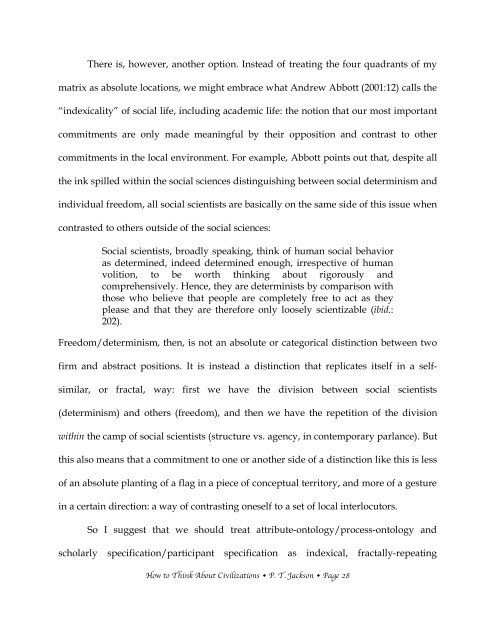How to Think About Civilizations - The Watson Institute for ...
How to Think About Civilizations - The Watson Institute for ...
How to Think About Civilizations - The Watson Institute for ...
Create successful ePaper yourself
Turn your PDF publications into a flip-book with our unique Google optimized e-Paper software.
<strong>The</strong>re is, however, another option. Instead of treating the four quadrants of my<br />
matrix as absolute locations, we might embrace what Andrew Abbott (2001:12) calls the<br />
“indexicality” of social life, including academic life: the notion that our most important<br />
commitments are only made meaningful by their opposition and contrast <strong>to</strong> other<br />
commitments in the local environment. For example, Abbott points out that, despite all<br />
the ink spilled within the social sciences distinguishing between social determinism and<br />
individual freedom, all social scientists are basically on the same side of this issue when<br />
contrasted <strong>to</strong> others outside of the social sciences:<br />
Social scientists, broadly speaking, think of human social behavior<br />
as determined, indeed determined enough, irrespective of human<br />
volition, <strong>to</strong> be worth thinking about rigorously and<br />
comprehensively. Hence, they are determinists by comparison with<br />
those who believe that people are completely free <strong>to</strong> act as they<br />
please and that they are there<strong>for</strong>e only loosely scientizable (ibid.:<br />
202).<br />
Freedom/determinism, then, is not an absolute or categorical distinction between two<br />
firm and abstract positions. It is instead a distinction that replicates itself in a selfsimilar,<br />
or fractal, way: first we have the division between social scientists<br />
(determinism) and others (freedom), and then we have the repetition of the division<br />
within the camp of social scientists (structure vs. agency, in contemporary parlance). But<br />
this also means that a commitment <strong>to</strong> one or another side of a distinction like this is less<br />
of an absolute planting of a flag in a piece of conceptual terri<strong>to</strong>ry, and more of a gesture<br />
in a certain direction: a way of contrasting oneself <strong>to</strong> a set of local interlocu<strong>to</strong>rs.<br />
So I suggest that we should treat attribute-on<strong>to</strong>logy/process-on<strong>to</strong>logy and<br />
scholarly<br />
specification/participant specification as indexical, fractally-repeating<br />
<strong>How</strong> <strong>to</strong> <strong>Think</strong> <strong>About</strong> <strong>Civilizations</strong> • P. T. Jackson • Page 28
















